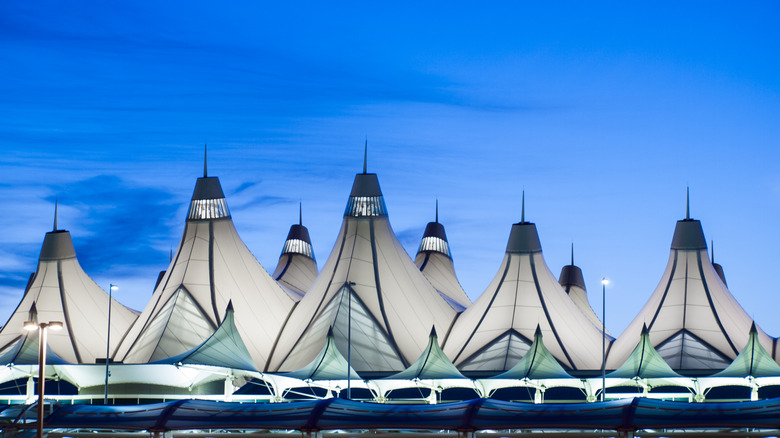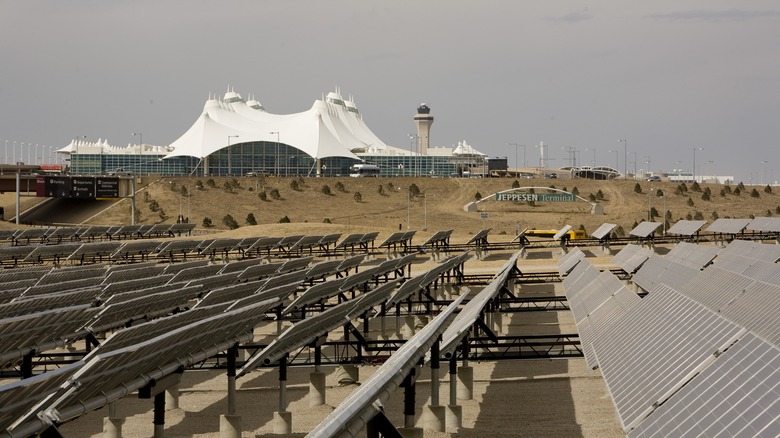This Popular Airport Is Considered The Most Sustainable In America
Airports and sustainability don't seem like two words that could exist together in the same sentence. And yet, the Denver International Airport (DEN) stands as a shining example of how airports worldwide can (and should) do better regarding sustainability.
Air travel is a well-known cause of carbon emissions, contributing significantly to the global carbon footprint. Rather than move forward with the status quo, some airlines are using "green airfares" to offset their emissions. Though the efficacy of these green airfares is another conversation entirely, it's a step in the right direction. Of course, airplanes aren't the only players in the air travel industry that contribute to global climate change — airports also have a stake in this environmental crisis.
As Denver International Airport's website states, airports must do more than recycle to be truly committed to sustainability. To improve their environmental impact, noise pollution, ground vehicle emissions, waste, energy use, air quality, and water use are all significant issues airports must tackle. So, is DEN going above and beyond to earn its title as one of the greenest airports? Or is it all greenwashing?
Denver International Airport's commitment to sustainability
According to DEN's sustainability and environmental policies, it is considering the long-term impacts of the airport's economic, social, and ecological activities. But how well does this translate into the real world? As it turns out, pretty well! DEN has robust, sustainable energy production and conservation programs, diverting tons of carbon emissions and improving energy conservation.
DEN also has one of the largest solar energy programs of any airport worldwide. These include Community Solar Gardens and four solar arrays (groups of solar panels) that directly power the airport, accounting for 8% of the airport's annual energy usage. It also has over 50 electric vehicle charging stations for use by both passengers and employees. Soon, it will expand its solar program with rooftop solar arrays across all four concourses as the airport advances.
When it comes to its ground fleet, the airport ranked 3rd nationally in "Green Fleets of North America" in 2023. This is thanks to 26% of its vehicles being powered by alternative fuels such as compressed natural gas. The airport is also investing in energy-saving efforts for its buildings. It is projected to reduce CO2 emissions by over 30,000 metric tons per year — the equivalent of removing over 6,600 vehicles from the road. Finally, DEN has diverted 2,000 tons of waste through recycling and repurposing programs.
Denver International Airport also makes a positive impact on the community
DEN isn't just committed to making strides in environmental sustainability and community impact. As one of the busiest airports in the world, they understand their sway over the passenger experience and their operational effects on the surrounding communities and wildlife.
Regarding the passenger experience, DEN offers private areas for religious worship, water refill stations, an open-air space, and plenty of healthy dining options. For art lovers (and those interested in Denver Airport conspiracy theories), there are also heaps of different kinds of art on display, including elaborate murals and larger-than-life sculptures. What better way to kill time before your flight than taking a moment to appreciate the curated collections in your concourse?
Denver- and the entire state of Colorado- is well-known for its beautiful and serene nature. As a result, noise complaints are just a given. We get it; no one wants to hear an airplane thundering overhead while gazing at the nearby forest. However, DEN does its best to avoid causing excess noise by retaining air traffic to agricultural, uninhabited, or commercial areas. As for the local wildlife, DEN has implemented a Wildlife Hazard Management program to control and protect local habitats surrounding the airport. They also use non-lethal methods to deter wildlife from interfering with aircraft and ground crew operations.


